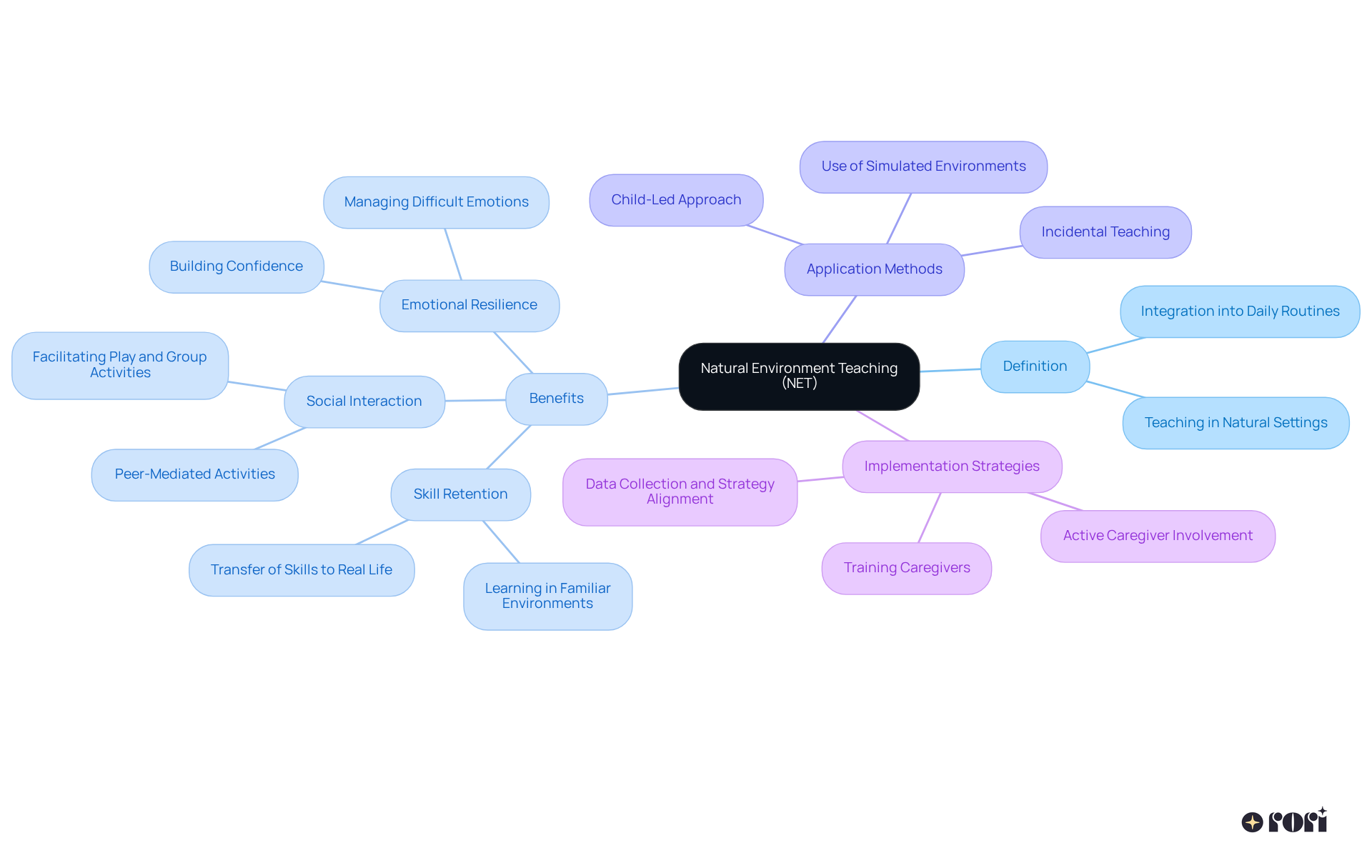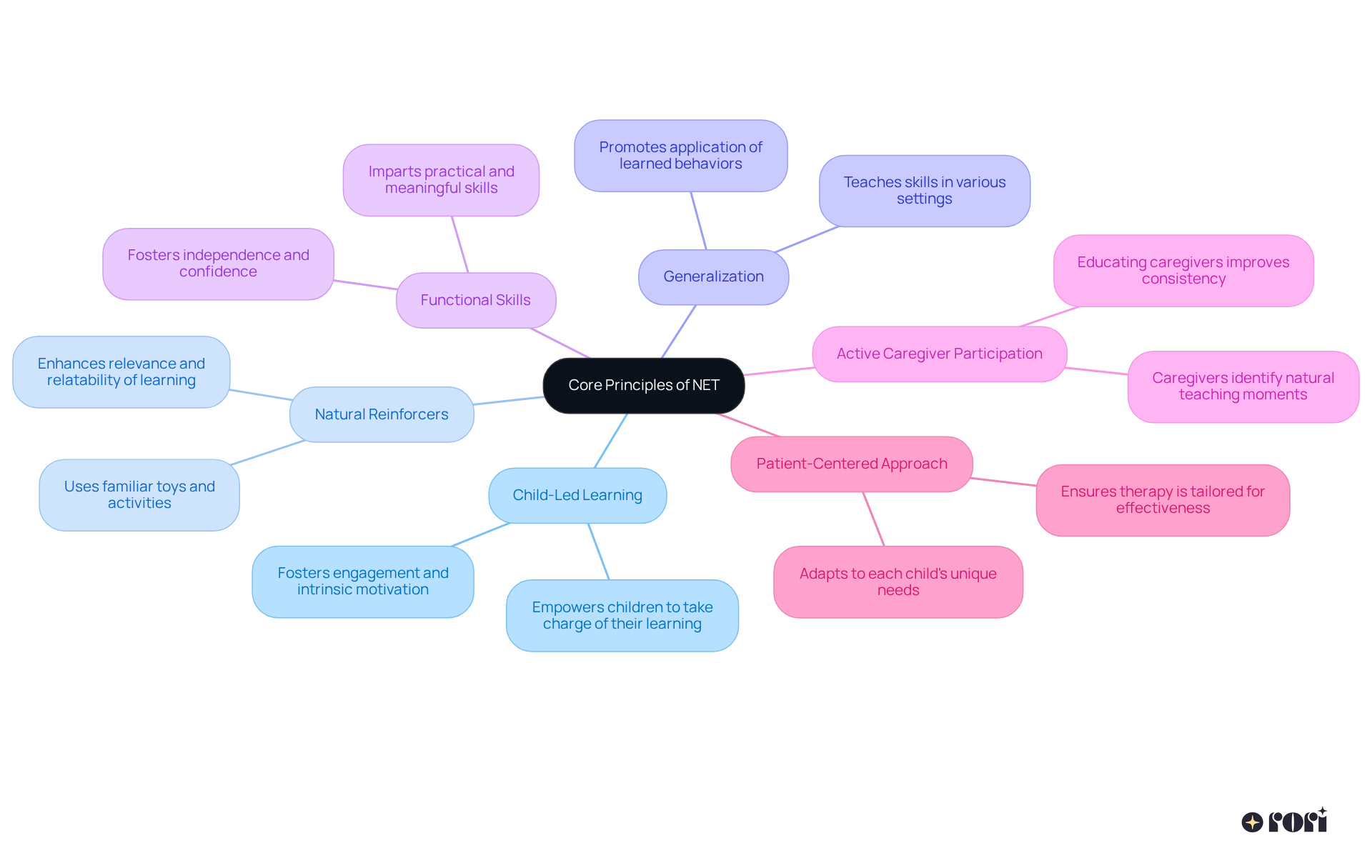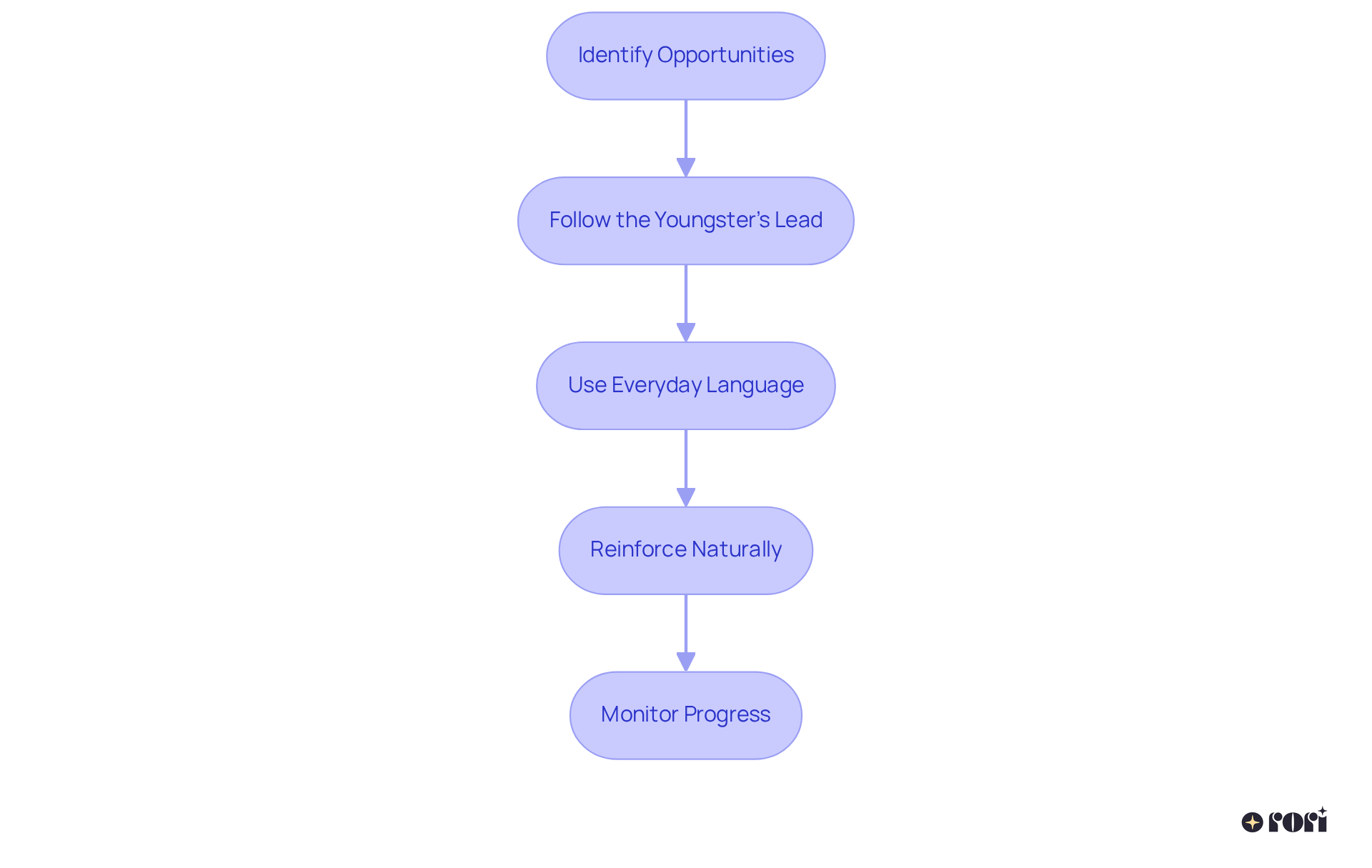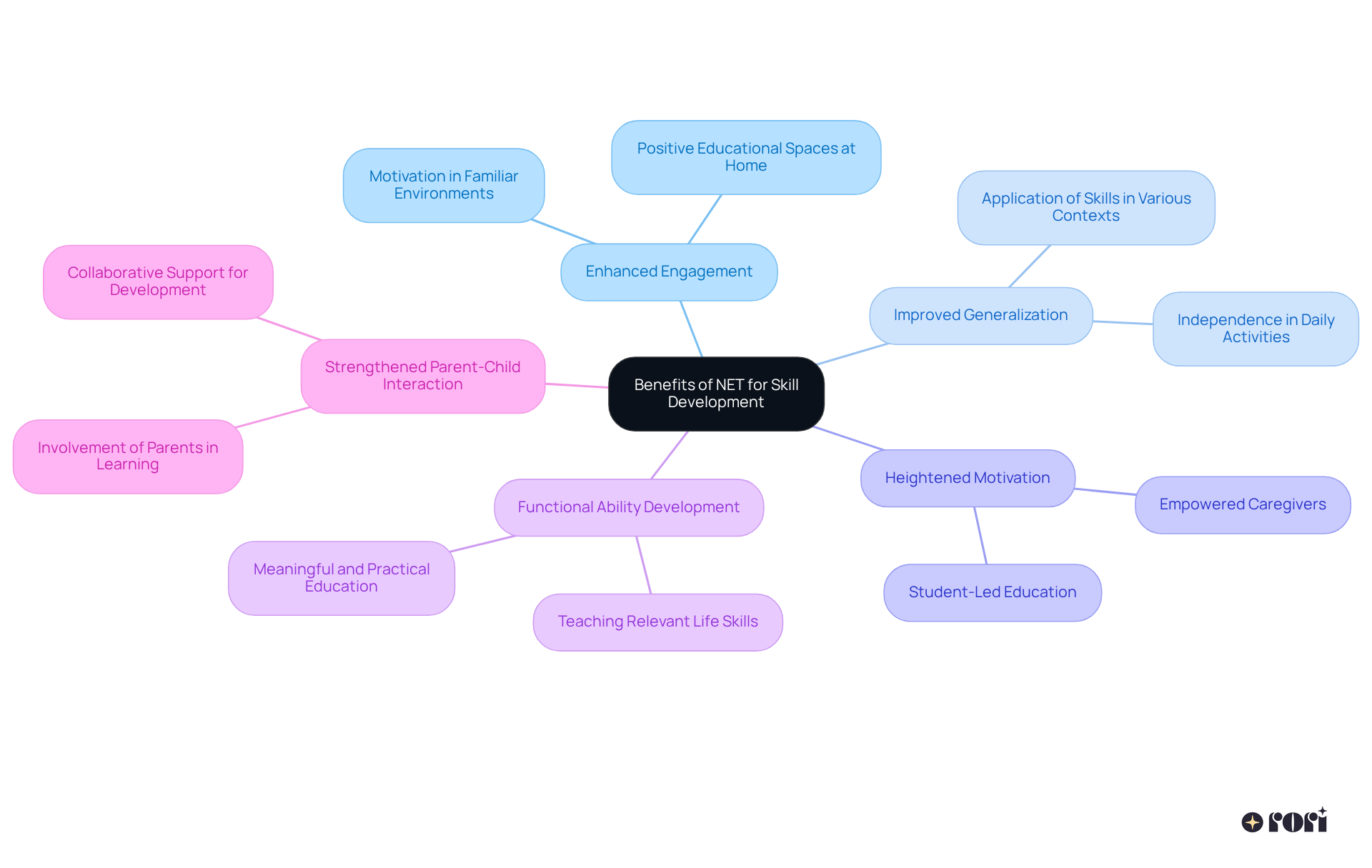This article dives into mastering Natural Environment Teaching (NET) within ABA therapy, specifically aimed at enhancing skill development in children, especially those with autism. It's all about how NET shines through its child-led approach, the use of natural reinforcers, and the active involvement of caregivers. These elements not only spark engagement but also help kids generalize their skills in real-life situations.
Let’s explore this together! By focusing on what truly matters to children, NET creates a nurturing environment where learning feels natural and fun. Imagine your child thriving in everyday settings, picking up new skills while playing or interacting with family. It’s a beautiful way to foster growth and connection, making learning a joyful experience for everyone involved.
We’re here to help you every step of the way! Understanding how NET works can empower you as a parent to support your child's development effectively. So, let’s keep the conversation going—share your thoughts or experiences with us!
Natural Environment Teaching (NET) is a transformative approach within Applied Behavior Analysis (ABA) therapy, and it highlights the importance of learning in real-world contexts. This method not only enhances skill acquisition but also promotes independence and social interaction for children with autism. As caregivers and therapists navigate traditional, structured teaching methods, a question often arises: how can we integrate learning into everyday activities to revolutionize skill development and ensure lasting behavioral change?
Exploring the principles and strategies of NET opens up a pathway to unlocking the full potential of children, making learning both meaningful and effective. Let’s explore this together! 🌟
Natural Environment Teaching (NET) is such an exciting method within net aba therapy! It focuses on teaching skills in the natural settings where they will actually be used. Unlike traditional ABA techniques that often rely on structured environments, NET seamlessly weaves learning into everyday activities. This means kids can develop skills in ways that resonate with their own experiences. It’s particularly beneficial for children with autism, as it helps them transfer skills across different situations, ultimately fostering greater independence in real-life scenarios.
Recent studies show that NET significantly boosts skill retention and application. Kids learn in familiar environments that mimic real-life situations, making the process so much more engaging! For instance, when children are involved during playtime or community outings, learning becomes fun and meaningful. Plus, the flexibility of NET allows for spontaneous teaching moments, where caregivers and therapists can seize natural opportunities for growth.
But the benefits of NET go beyond just skill development! It also nurtures social interaction, emotional resilience, and self-confidence in children. By embedding education within meaningful contexts, young individuals are more likely to engage actively and grasp the purpose behind their learning. As one expert beautifully put it, "By integrating education into daily routines and settings, NET not only enhances skill generalization and social development but also fosters greater independence and confidence."
To make NET work, active caregiver involvement and a youth-led approach are crucial. This ensures that learning aligns with each child's interests and developmental stage. This collaborative effort not only keeps progress on track but also allows families to be vital partners in their child's therapeutic journey. Training caregivers to spot natural teaching moments is key for consistency and success in NET. By empowering caregivers with the knowledge and skills to support their child's behavioral goals, Rori Care highlights the importance of strategy alignment and data collection to maximize the intervention's impact. As research continues to affirm the effectiveness of net aba therapy, it is poised to become a foundational element of holistic, meaningful ABA interventions that empower individuals with autism to thrive in every aspect of life. Let’s explore this together!

Natural Environment Teaching (NET) aba therapy is founded on several core principles that significantly enhance its effectiveness.
First up, we have Child-Led Learning! This approach empowers children to take charge of their own learning journey, which fosters greater engagement and intrinsic motivation. It’s all about making education enjoyable and encouraging kids to actively explore their interests.
Next, let’s talk about Natural Reinforcers. Skills are taught using things that naturally occur in the child's environment, like their favorite toys or activities. This relevance makes the learning experience much more impactful and relatable.
Then there’s Generalization. By teaching skills in various settings—like home, playgrounds, or during outings—NET promotes the application of learned behaviors across different contexts. This adaptability is super important for real-world success!
We also focus on Functional Skills. The goal here is to impart skills that are practical and meaningful in the child's daily life. This way, education isn’t just theoretical; it’s applicable, helping to foster independence and confidence in everyday situations.
Don't forget about Active Caregiver Participation! Caregivers play a vital role in the success of NET by identifying natural teaching moments and reinforcing learning in daily routines. Educating caregivers in ABA principles and aligning strategies improves consistency and effectiveness, maximizing the intervention's impact. Plus, data collection is essential, allowing caregivers to track progress and adjust strategies as needed.
Last but not least, we have the Patient-Centered Approach. NET is designed to adapt to the unique needs of each child, ensuring that therapy is tailored just for them. This focus is fundamental to the effectiveness of net aba therapy.
Research keeps confirming the effectiveness of NET, showing significant advancements in communication, social abilities, and independence for children with autism. Together, these principles create a strong foundation for development, making net aba therapy an essential component of effective ABA therapy. When paired with early intensive behavioral intervention (EIBI), it really enhances learning, verbal, and social abilities!
Let’s explore this together and see how we can support our little ones on their journey!

To effectively implement NET strategies in your daily routines, let’s consider some practical steps together:
Identify Opportunities: Take a moment to observe daily activities like meals, playtime, or outings. These are natural moments where skills can be taught. It aligns perfectly with Rori Care's commitment to net aba therapy and personalized support, ensuring that strategies are tailored to each young person’s unique needs and progress.
Follow the Youngster’s Lead: Encourage your child to pick activities that spark their interest. This not only fosters greater engagement but also boosts their motivation. Rori emphasizes empowering families in the autism care process, enhancing caregiver involvement and informed decision-making.
Use Everyday Language: Make sure to use language that resonates with your child’s daily experiences. This approach makes learning more relatable and effective.
Reinforce Naturally: Utilize natural reinforcers like praise or access to preferred activities. This encourages your child to apply their skills in context, which is crucial for improving behavioral outcomes.
Monitor Progress: Keep an eye on your child’s development and adjust strategies as needed to support their ongoing growth. Rori Care - net aba therapy provides resources and articles on technology-enhanced methods for behavior modification, empowering caregivers with ABA principles and techniques to support their child’s behavioral goals. Remember, net aba therapy is the only scientifically proven treatment for autism that insurance covers, ensuring families have access to effective support.
Let’s explore this together, and remember, we’re here to help you every step of the way!

Natural Environment Teaching (NET) is a form of net aba therapy that brings a host of benefits for skill development in children with autism, and it's exciting to explore these together!
Enhanced engagement through net aba therapy occurs when teaching in natural settings, which really boosts children’s motivation. They’re often more eager to participate in familiar environments! This aligns beautifully with the idea of Enhanced Support, as caregivers can create positive educational spaces right at home using net aba therapy.
Net aba therapy enhances improved generalization, as skills learned in real-life situations become easier to apply in various contexts, helping kids gain independence in their daily activities. This is where Informed Decision-Making comes into play, as caregivers start to spot those valuable opportunities for skill application.
Heightened motivation is achieved through net aba therapy, which encourages student-led education and sparks intrinsic motivation. It’s wonderful to see youngsters taking charge of their learning journey! And as caregivers become empowered by net aba therapy, they’re better equipped to support their children’s behavioral goals.
Functional Ability Development in net aba therapy emphasizes teaching skills that are directly relevant to a young person’s life, thereby making education both meaningful and practical. This approach leads to improved behavioral outcomes, as children can use their skills in everyday situations.
Strengthened Parent-Child Interaction: Involving parents in the learning process through net aba therapy not only deepens the bond with their children but also empowers them to support their development effectively. This collaborative spirit of net aba therapy is so important, as it nurtures a supportive environment aligned with Rori Care’s dedication to neurodiversity and children’s success.
Let’s explore this together! We’re here to help you every step of the way!

Natural Environment Teaching (NET) is such an exciting approach within ABA therapy! It emphasizes learning in real-world contexts, which is so important for our kids. By blending skill development into everyday activities, NET not only helps children with autism gain independence but also ensures that the skills they learn are relevant to their daily lives. This method shifts the focus from traditional, structured environments to more natural settings, making learning engaging and meaningful.
Throughout this article, we’ve highlighted key principles like:
These strategies create an environment where children can truly thrive, enhancing their communication, social skills, and overall confidence. Plus, by emphasizing generalization and functional skills, what children learn can be applied in various situations, reinforcing their ability to navigate the world independently.
The significance of NET in ABA therapy is huge! It’s a powerful tool that not only helps with skill acquisition but also strengthens the bond between caregivers and children through collaborative learning experiences. As families and caregivers embrace these strategies, they become integral partners in their child’s development journey. By prioritizing NET, we can create a nurturing environment where children with autism can flourish, leading to a brighter, more independent future. Let’s explore this together and continue supporting our kids every step of the way!
What is Natural Environment Teaching (NET) in ABA therapy?
Natural Environment Teaching (NET) is a method within ABA therapy that focuses on teaching skills in natural settings where they will be used, integrating learning into everyday activities rather than relying on structured environments.
How does NET benefit children with autism?
NET helps children with autism transfer skills across different situations, fostering greater independence in real-life scenarios. It enhances skill retention and application by allowing kids to learn in familiar environments that mimic real-life situations.
What makes learning through NET engaging for children?
Learning through NET is engaging because it occurs during meaningful activities, such as playtime or community outings, making the process fun and relevant for children.
What additional benefits does NET provide beyond skill development?
NET nurtures social interaction, emotional resilience, and self-confidence in children by embedding education within meaningful contexts, which encourages active engagement and understanding of the learning purpose.
What is the role of caregivers in implementing NET?
Active caregiver involvement is crucial in NET. Caregivers must be trained to identify natural teaching moments and ensure that learning aligns with each child's interests and developmental stage, making them vital partners in the therapeutic journey.
How does Rori Care emphasize the importance of caregiver training in NET?
Rori Care highlights that training caregivers to spot natural teaching moments is key for consistency and success in NET. Empowering caregivers with knowledge and skills supports their child's behavioral goals and maximizes the intervention's impact.
What does ongoing research suggest about the effectiveness of NET?
Ongoing research continues to affirm the effectiveness of NET in ABA therapy, indicating that it is becoming a foundational element of holistic, meaningful interventions that empower individuals with autism to thrive in various aspects of life.